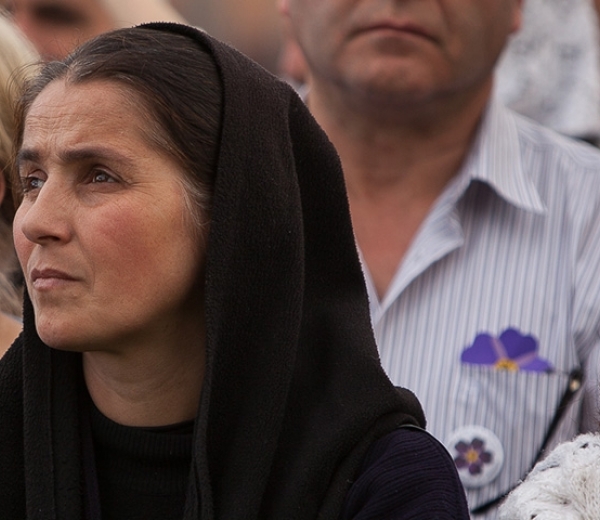Descending From Saints
Submitted by global publisher on Fri, 05/01/2015 - 20:28
English
By Anna Arutunyan
How does a nation adequately commemorate a horrific event that still sparks disagreement as to whether it actually happened or not? For Armenia's Genocide Centennial events, a remarkably apt slogan was chosen: “I remember and demand.”
Demand is a transitive verb that requires an object. In this case, that object – implied to be, among other things, recognition of the Genocide by the rest of the world – is suspended. But while recognition would be a crucial component in allowing descendants of survivors to cope with the tragedy, the Centennial events stretched beyond recognition as the focal point. In doing so, the commemorations gave Armenians a great deal of agency in coming to terms with a catastrophe without depending upon others' decisions on whether to recognize it as Genocide or not. Yes, we demand recognition, but there is also so much more to honor, remember and draw upon for the future.
This is important for a number of reasons, primarily psychological. One issue that resurfaced over and over again in comments made by visitors and residents of Yerevan alike was the pain of remembrance.
This is how Irina Pogosian, a university professor, described it:
“For me personally, these two days were extremely difficult. Because it is the Centennial, there were more events than usual. Being Armenian, even though my family was not affected by the Genocide, it is very painful. Just looking at the films being shown on television I could not stop crying. I could not leave the house. Those families that survived continued to raise their children with this legacy. It is not lost. The stories are passed down, relayed among family and friends. That is why even 100 years later it remains traumatic for the Armenian people and these atrocities cannot be forgotten. Everyone knows at least one Armenian who was affected by this, whose family lost their home and their lives.”
But there was also something unexpected in the answers people gave to questions about the commemoration and what it meant for them: they had no words to describe it.
“The 1.5 million – they are too much like Jesus to me, I cannot explain it,” said Silva Arslanyan, who came with her husband to the Etchmiadzin Canonization ceremony from their home in Beirut, Lebanon.
“No words” echoed again and again in responses from spectators at the ceremony. That may seem obvious, given the emotional impact of 1.5 million victims being recognized as saints. But the loss for words suggests something else as well: people feel that after so many words have been spilled talking it is clear that mere words would never undo a wrong. Would the canonization make a global impact? Is global impact really the point?
For Margarita Mateosian, who had traveled to Etchmiadzin from her home in Argentina and who is a descendent of survivors, the commemoration was deeply personal.
“My four grandparents were victims of the Genocide. They went to Argentina and started their lives over. They were children when they escaped, not more than eight or ten years old. One [grandfather] was in an orphanage, another had to escape alone through the desert, his brothers were killed in front of him. My two grandmothers were helped by different families, because they were separated from their mothers and their fathers were killed. I don't know if [the canonization] will be a significant for the rest of the world. But for us it is very important. It has been a hundred years. This is spiritual. Not more than that.”
History and politics also had a place as Armenia commemorated the victims. But it was this focus on the spiritual – where words were not always necessary – that had the most empowering effect.
Bishop Bagrat Galstanyan, who took part in the canonization ceremony, said it well: "I cannot say anything about the political side of it. But spiritually, morally speaking, we are elevating them from being victims to the rank of victory. It's a psychological change. Since the Genocide of 1915 we have perceived them as victims. Now we will be accepting them as those who have been victorious over death."
Weight:
-5
Image:

Display type:
Big
Subtitle:
Making sense of the Armenian Genocide Centennial
